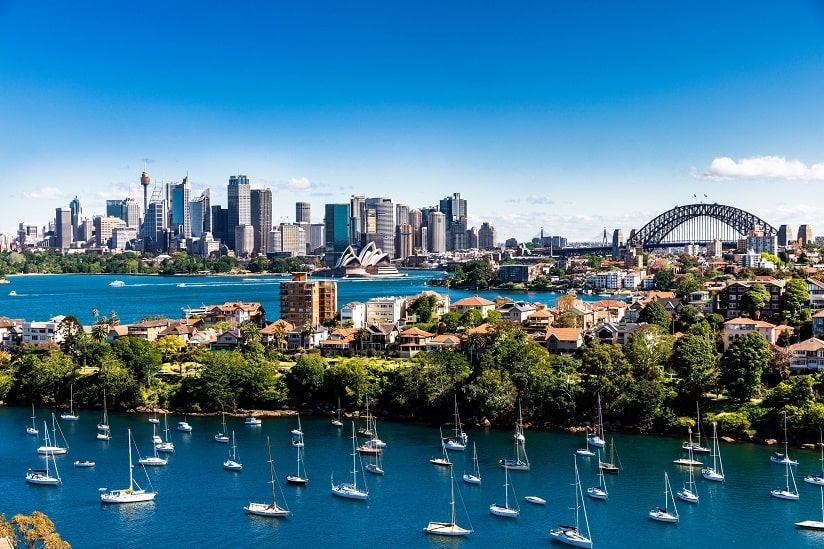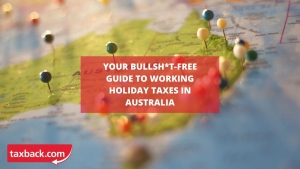Maximizing Your Returns: 6 Expert Tips for Tax Reclaim in Australia
Your working holiday tax questions answered!
Did you work in Australia? You could be due a BIG tax reclaim in Australia! In fact, the average Australian tax refund is AU$2,600. In this blog, we’ll explore how you can claim your maximum legal Australian tax rebate. We’ll also discuss your residency status, work expenses, Superannuation, filing a tax return and more.
So let’s get into it so you can find out some tips about getting your tax back in Australia!
How can I determine my Australian tax residency?
Tax residency is one of the biggest factors affecting how backpackers are taxed in Australia.
In reality, it’s easy to tell whether you are considered a resident or non-resident for tax reclaim in Australia.
All temporary visa holders entering Australia should pay the non-resident rate of tax during their first six months in Australia in order to comply with local tax law.
While this means that you will be paying a higher rate of tax than the resident rate, it’s important to comply with Australian tax law and ensure that you’re not left with a tax liability when you depart Australia.
Will my tax residency status affect my tax reclaim in Australia?
If you become an Australian resident for tax purposes, you may be entitled to a tax reclaim in Australia of the tax you paid at the higher rate when you were a non-resident.
Backpackers on 416 and 426 Visas are generally considered non-residents for tax purposes and are required to pay 15% tax on their earnings at first. However, factors such as how long you've been in the country and your behaviour, while you're in Australia, can influence whether you'll be seen as a resident in the future.
For example, if you come on a backpacker Visa from one of these eight countries (Chile, Finland, Germany, Israel, Japan, Norway, Turkey, or the United Kingdom) and you are staying in Australia for longer than six months, live in the same place and establish ties with the local community, then you'll be considered a resident for Australian tax return purposes. This means that you may be able to claim the majority of tax withheld at source by your Australian employers after the end of the financial year (June 30).
If you’re having trouble determining your tax residency status, it can be a good idea to engage the services of a tax agent like Taxback.
Our team can help you:
- determine your tax residency status
- avoid tax liabilities
- maximise your tax reclaim in Australia
You can also use our tax back calculator to find out if you are due a tax reclaim.
Our average Australian tax refund is AU$2600
Can I claim any work expenses on my tax reclaim in Australia?
Expenses are a great way to boost your tax refund or minimise any tax liability in Australia. Some expenses related to your occupation are tax deductible, so it really depends on what your job was in Australia.
To claim an expense it must:
- have been paid for by yourself and you weren’t reimbursed
- related to your job
- be recorded. In other words, you must have a receipt or proof of the expense (with some exceptions)
Types of expenses:
There are many different types of expenses you can claim, such as tools, equipment, and travel between work and home in some cases. Common items also include courses such as RSA, RCG, and white cards. All these items are deductible and can have a big impact on your tax reclaim in Australia.
A more detailed list of allowable expenses can be found here.
There are some exceptions, however, in most cases, you should retain all your receipts for work expenses so you will have proof for the Australian Tax Office.
Can I get a Medicare Levy Exemption Letter?
The Medicare levy is the universal health scheme for Australians and is partly funded by taxpayers who pay a levy of 2% of their taxable income. It guarantees Australians and some other nationalities (Britons and Italians) access to healthcare at little or no cost.
Some people are exempt from paying the levy, including some foreign citizens, yet it’s still deducted from their wages. These citizens should apply for an exemption letter which will boost their tax reclaim in Australia.
You must earn over $24,276 for 2022/2023 in the financial year to be eligible for a Medicare levy exemption and submit a Medicare Entitlement Statement separately to your tax return application. It might take about 10-12 business days longer to get your refund but it will be worth it!
Do I have to declare bank interest on my Australian tax reclaim?
Yes. You must disclose any interest you earned from the bank on your annual tax return. The Australian Tax Office has visibility on taxpayers’ bank interest, so by not declaring it, you will simply delay your refund. Bank institutions issue an annual bank interest statement at the end of each financial year.
When are tax returns due for Australia?
The deadline to lodge your tax reclaim in Australia is 31 October.
Your tax return must relate to the previous tax year (1 July – 30 June).
How can I get my Australian Superannuation refund?
Even if you’re not eligible for an income tax rebate, you should still be eligible to claim back superannuation.
Superannuation (or ‘super’) is a system for employees in Australia to gather enough funds to replace their income in retirement. If you’re over 18 and earn more than $450 per month in Australia, your employer was obliged to pay 11% of the value of your ordinary time earnings into a super fund on your behalf.
If you don't plan on retiring in Australia and intend to leave the country, you can still claim some of it back. This refund is called a 'Departing Australia Superannuation Payment’ (or DASP) and you can only claim it if your visa has expired and you’ve left Australia.
DASP can be a hefty sum. In fact, Taxback customers receive an average Superannuation refund of AU$1,908.
You can apply for your DASP directly to the Australian Tax Office (ATO). Alternatively, if filling out boring paperwork sounds like the last thing you’d like to do, the Taxback team can help you apply for Australian income tax and Superannuation refunds. We can help you to get your visa cancelled to speed up the process. And if you’ve lost any of your Superannuation documentation, we can even chase this up for you!
Why not apply for your Superannuation refund now? Claim Australian super today!
The average superannuation refund is $1908
Will my Australian Superannuation Refund be taxed?
Yes.
Working holidaymakers on 417 or 462 visas: If your Departing Australia Superannuation Payment (or DASP) is processed on or after 1 July 2017, your superannuation refund will be taxed at a rate of 65%. If your superannuation refund is processed before 1 July 2017, then your superannuation refund will be taxed at a rate of 38%.
Other visa holders: Your DASP will be taxed at 38%.
It’s been years since I left Australia. Can I still reclaim my Australian Superannuation refund?
Yes! As long as you have left Australia and your visa has expired, you can apply for your Superannuation refund. Keep in mind that the amount you can claim back will depend on your super fund balance. Most super funds have monthly administrative and insurance premium fees that decrease the total funds amount in time.
Can I return to Australia after I have applied for my Superannuation refund?
Yes, you may still return to Australia on another visa, even if you have claimed your Superannuation refund.
Our average Australian tax refund is AU$2600
Why should I choose Taxback?
Easy!
- Our service is hassle-free. We do the paperwork. You get a refund!
- We'll maximise your tax refund
- We'll help you retrieve any missing info or documents
- You can use our tax return calculator for Australia to find out if you are due a tax back
- We'll update you so you can get on with life while we get your money back for you!
- Free, no-obligation refund estimate before you begin the process
In conclusion, you might be eligible for a substantial tax reclaim in Australia, with the average tax refund being AU$2,600.







